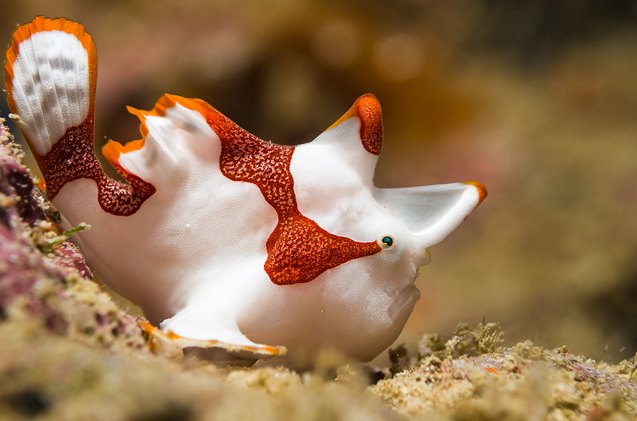Frogfish


About Frogfish
The species known as frogfish are all members of the family Antennariidae which is sometimes known as the anglerfish family, especially in Australia. For the most part, frogfishes (also known as anglers) are small with short and stocky bodies that are sometimes covered in spinules and myriad appendages to act as camouflage. Most species range from 1 to 15 inches in length and many of them are peaceful by nature, though some can be semi-aggressive. If you do plan to keep anglers with other fish, make sure they are non-aggressive and not small enough to be viewed as prey.
The species known as frogfish are all members of the family Antennariidae which is sometimes known as the anglerfish family.
Frogfishes can be found in all parts of the world in subtropical and tropical oceans and seas, though they are not found in the Mediterranean Sea. They are most common in the Atlantic, Pacific, and Indian Oceans as well as the Red Sea.
While some frogfish are quite drab, many species exhibit bright colors like yellow, green, and red, often with black or colored spots to aid in their camouflage. There is the potential for wide variation in color, even within a single species.
Frogfish typically inhabit the lower levels of the water column, using their unique physical adaptations as camouflage among corals and rock reefs. The aquarium for frogfish should be decorated with live rock and sandy substrate that they can burrow into. As for the water conditions frogfish prefer, a slightly alkaline pH range between 8.1 and 8.4 is ideal with moderate hardness between 8 and 12 dKH.
Frogfish are small with short and stocky bodies that are sometimes covered in spinules and myriad appendages to act as camouflage.
The frogfish is not a particularly active species – it relies on its camouflage ability to remain hidden until their prey approaches. When they are ready to strike, frogfish can strike very rapidly in under 6 milliseconds. These fish tend to feed on crustaceans and small fish, even other frogfish. In captivity you may need to use live feeder shrimp to entice these fish to eat and then transition them onto a diet of fresh and frozen meaty foods.
Also read: Setting a Schedule for Routine Tank Maintenance
There is not a great deal of research available regarding the breeding habits of frogfishes. Some species seem to be free spawners, with the female releasing eggs into the water column for the male to fertilize. Some species spawn over substrate and some of them actual guard their eggs until hatching, though most do not.
The exact number of frogfish species is unknown but it is commonly believed to be in the range of 48 to 52. Some of the most popular species for the aquarium trade include the following:
- Yellow Frogfishes (Antennarius maculatus)
- Wartskin Frogfishes (Antennarius maculatus)
- Commerson’s Frogfishes (Antennarius commerson)
- Ocellated Frogfishes (Antennarius ocellatus)
- Longlure Frogfishes (Antennarius multiocellatus)
- Painted Frogfishes (Antennarius pictus)
Photo credit: AndamanSE/Bigstock; SuwatSir/Bigstock

Kate Barrington is the loving owner of two cats (Bagel and Munchkin) and a noisy herd of guinea pigs. Having grown up with golden retrievers, Kate has a great deal of experience with dogs but labels herself a lover of all pets. Having received a Bachelor's degree in English, Kate has combined her love for pets and her passion for writing to create her own freelance writing business, specializing in the pet niche.
More by Kate Barrington
























